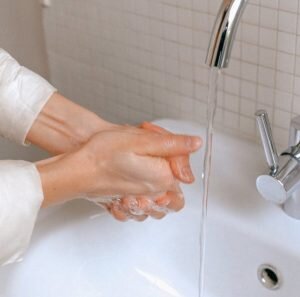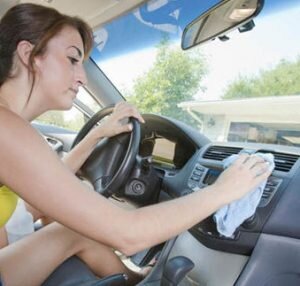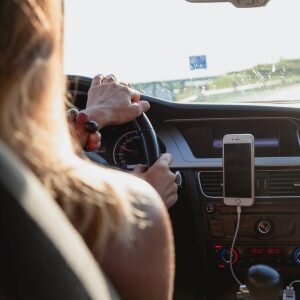Coronavirus: Protecting Yourself, Your Family, and Your Vehicle.
Worried about your car during the coronavirus outbreak? We've got your covered!Are you an essential employee and need necessary repair or maintenance on your car? Is your car waiting out the coronavirus with you? Is your registration and inspection expired? Here's how you can protect yourself and your car whether you are driving every day or sitting at home waiting it out!Q 1: How can I reduce my chances of catching COVID-19?A 1: The quickest and easiest way to prevent exposure to the coronavirus and to get society back to somewhat normal is to stay home and practice social distancing! You should also practice these healthy habits!
- Immediately reduce the amount of non-essential outside activities you need to do for you and your family. Keep kids and pets at home as much as possible. Avoid physical contact with people that you are not already quarantined or living with. COVID-19 is easy to catch and many carry it without symptoms. Please stay home and stay six feet away from people when you are out.

- Wash your hands frequently throughout the day. Wash those babies until they’re dry and cracked. Wash them before you eat. Wash them after you use the bathroom. Wash them as soon as you come in from outside. Wash them after you have touched surfaces that many other people may have touched.
- Have hand sanitizers accessible when you are not able to wash your hands. Please don’t hoard these items. Using hot soap and water to wash your hands is the best defense to preventing coronavirus.
- Take off outside shoes as soon as you walk inside your home. Don’t track coronavirus germs all over the house.
- Wear a mask to cover your face when you go outside and come in contact with people. If you don’t have a mask use a scarf or bandana. Anything to cover your mouth and nose to help with some protection. Masks won’t completely prevent you from getting COVID-19. It can spread through your eyes as well as your nose and throat. But wearing a mask helps to stop the spread of large particles and droplets, which may give you some peace of mind. Also try safety glasses to protect your eyes when you go out.
- Avoid touching your face. Good luck with that! Haha
- Disinfectant wipes should be used to wipe down surfaces that come in contact with your hands often, like doorknobs, cell phones, remote controls, refrigerator doors, computers, etc. Soap and water, disinfectant cleaners, alcohol and bleach can be used for household items and surfaces. You don’t need to go crazy with cleaning if you practice good habits.
Q 2: What can I do to protect my vehicle?A 2: Follow these simple cleaning and disinfecting procedures for your vehicle.
- FYI Coronavirus stays in the car for about 3 days.
- If you are an essential worker and must be outside around other people, you should disinfect your vehicle daily. If you have more than one vehicle per household, designate an “essential use” vehicle for the essential worker and have him or her use that vehicle only. Use the other vehicle for non-essential/not working family members, especially children and older adults, so they are not exposed as much.

- Carry hand sanitizer and disinfectant wipes in the vehicle with you. Use hand sanitizer on your hands and disinfect your keys each time you get into the car.
- Wipe down your steering wheel and controls, gear shift, all buttons and knobs on your dash, console and cup holders and your vehicle door handle inside and out each time you get out of your vehicle.
- Carry gloves with you and use them at gas pumps. Throw them away before you get in the vehicle.
- If you have the means at home: wash, vacuum, and wipe down your vehicle inside and out. Clean all surfaces. Clean and vacuum vehicle seats. It’s perfect timing for SPRING CLEANING now that winter is over. A full detail would be great for your vehicle as soon as we get out of this mess! She or he will probably need a little love.
Q 3: My state is on a stay-at-home order and I am not an essential employee. Can I still drive outside?A 3: Yes you can still drive on the road under certain conditions. Each state has different conditions. Check your state's website to find out which legal activities allow you to be driving on the road.
- You can drive outside to perform essential tasks like grocery shopping, going to the pharmacy and dropping kids off between families to name a few.
- I would not drive across state lines if you do not have permission to do so for work or for health reasons. Many state troopers and police are pulling over vehicles with out-of-state plates in states that have stay-at-home orders.
Q 4: My vehicle registration has expired. My state and/or emission yearly registration has expired. Can I still drive my vehicle? Will I be fined?A 4: Most likely, yes you can still drive your vehicle. If your state is on a stay-at-home order, the Department of Transportation services are likely closed. Many states have given drivers extended deadlines to renew their vehicle registration and state and emission testing and will not be fining drivers for expired information. Please go to your state’s DOT website to see what guidelines they have laid out for you. In Pennsylvania, they currently have deadlines for registration and inspection extended until May 31st 2020. Q 5: Is it bad for my vehicle to sit for too long? Should I do something to protect it while it waits out the coronavirus with me?A 5: Cars don’t like to sit for too long so it’s important to drive your vehicle periodically. Your vehicle needs to move to stay in shape just like your body. A car sitting for too long will rust, age, and get brittle from not being used.If you are not driving at all or have a vehicle sitting until the stay-at-home order is removed from your state, you should run the vehicle and if possible take it for a little drive once a week! Get those gears and computers and devices moving and shaking! You’ll charge the battery, circulate the fluids in your vehicle, get the tires and the brakes moving, and prevent things from sticking or seizing.If you choose not to drive on the road, run the vehicle for at least 10 minutes in park where it’s located.
- Open and close all of the windows.
- Turn on your wipers and use the washer fluid.

- Turn on all heat and a/c functions including defrost.
- Turn on all lights including turn signals. Test the high beams.Test the horn.
- Press on the brake pedal.
- Rev the engine slightly by pressing on the gas pedal lightly.
- Turn the parking/emergency brake on and off.
- Turn the steering wheel all the way to the right and then all the way to the left.
- Unplug any charging mount devices from the 12V outlet before turning the vehicle off.
- Take note of any dashboard lights, leaks under the vehicle, abnormal noises or smells. We have resources that can help you. The Glove Box Guide has a troubleshooting section or ask our shecanic community on facebook! We are here to help.
If you choose to go on a short 10 minute ride around your neighborhood, follow the steps above and do the following.
- Go into a parking lot and make a hard right turn and hard left turn where the wheel is turned all the way to the right or left.
- Put air in the tires if needed. Drive for at least 2 miles if the tire pressure light is on. If it doesn’t go off, put air in the appropriate tire(s).
- Fill up your gas tank with if it contains below ¼ of gas. Gas is really inexpensive right now!
Q 6: Should I take my vehicle in for maintenance and repairs during a stay-at-home order?A 6: It depends. While most people are at home and driving has been greatly reduced, some people still need to be on the road everyday. You should take your vehicle in for maintenance and repairs if
- you’re an essential worker and need to be driving regularly. Maintain your normal maintenance schedule and get necessary repair work. Anyone driving over 150 miles a week fits into this category as well.
- you are driving greater than 35 miles per week or more than 150 miles per month for essential activities. You must keep your vehicle safe on the road with essential maintenance and repairs.
- Does your vehicle have zero oil-life remaining or is your oil change overdue? Do you have no oil in the engine or very low oil in the engine? Get an oil change. Remember the most important maintenance to your vehicle is the oil change.
- Tires balding or very low tread, leaking, or damaged? Get them replaced to avoid a blowout, flat, or worse - a crash.
- Wipers torn or stuttering badly? You won’t be able to safely see driving in the rain.
- Car slow to start? Interior lights dim? Battery is on its last legs and your vehicle might not start next time you’re ready to go!
- Pressing that brake pedal to the floor to stop the vehicle? Get your brakes replaced.
- A flashing check engine light? Take it in to your PCT right away!
- Major vehicle issues, like overheating, severe wear of steering and suspension parts, shifting gears, and no starts should be handled ASAP.
If you don’t fit into the categories above, I’d wait until the stay-at-home order is lifted until you get the maintenance or repair completed. But also make sure you show your car some love in the quarantine. See Question 5 “Is it bad for my car to sit for too long?”Find a way to support your local PCT (Primary Care Technician). We offer gift certificates for when you are back outside and driving and we’re selling shecanic items on the website. Check it out--girlsautoclinic.com/shop/
Related Links If You Think Of An Engine Like A Vagina Every Last Dirty Detail; The Nitty Gritty of DIY Car Detailing